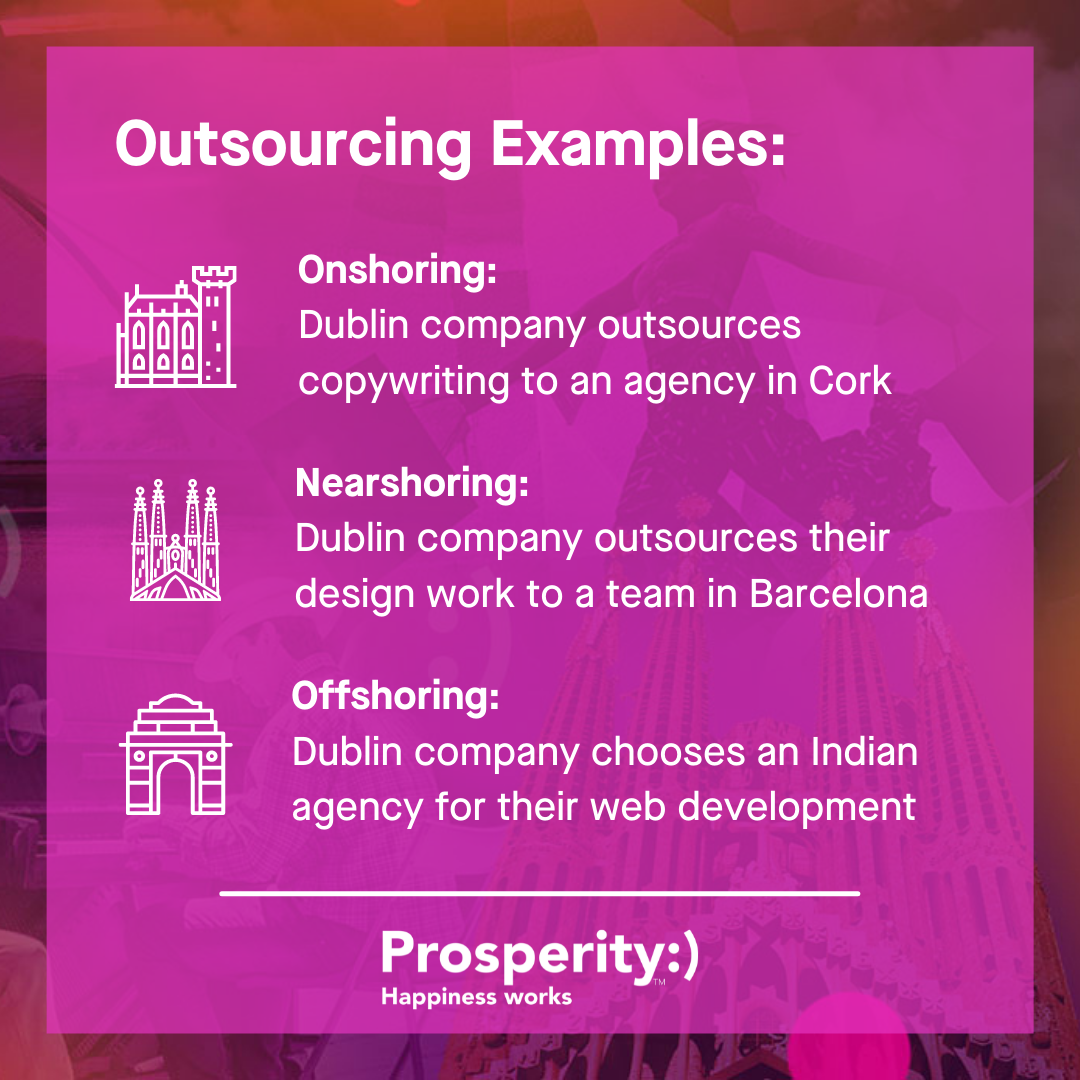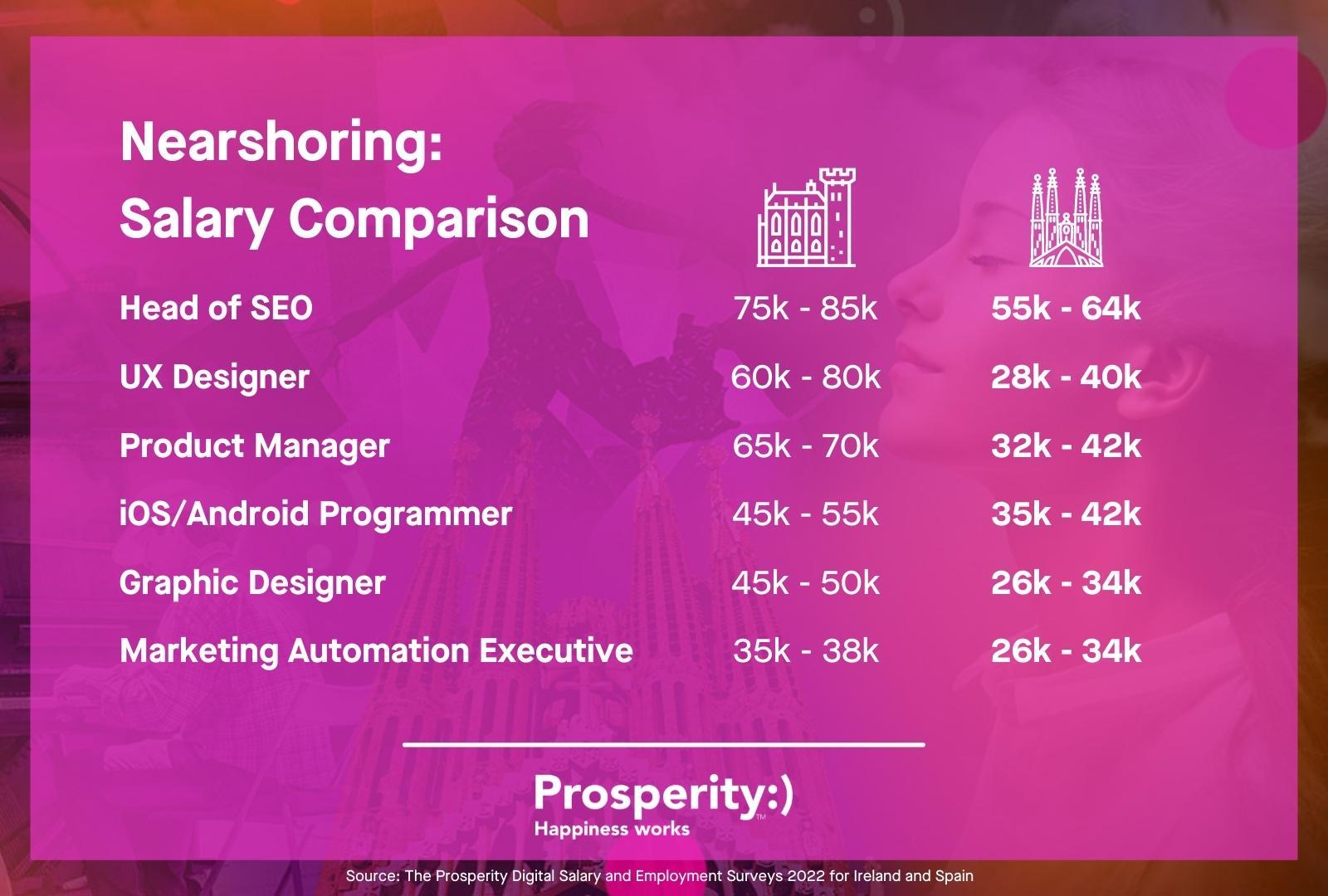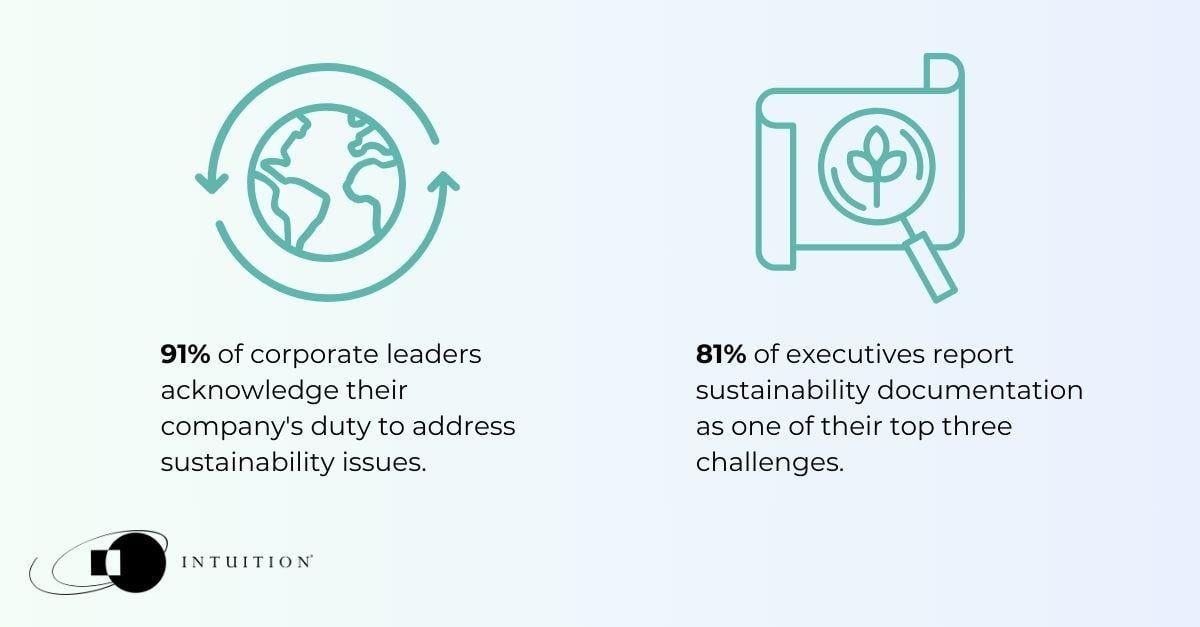
Nearshoring is an increasingly viable option for Irish companies looking to fill hard-to-recruit roles in a relatively fast, simple way. By paying their new staff member’s salary and a service fee to a company based in a different country geographically close to them – hence the name nearshoring – they can have access to the highly skilled staff they’re looking for with no need to deal with foreign HR and visas, awkward time differences, or relocation packages.
The advantages of nearshoring
Similar to other forms of outsourcing, nearshoring offers Irish companies the chance to:
- Cut one-off project costs
- Lower staffing costs
- Save time on recruitment
- Brings structure and expertise to your project
- Improving service and increasing quality
However, the advantages of nearshoring include being a cost-effective way to find candidates with advanced expertise while retaining a large degree of staff control and integration, making it ideal for mid- to long-term collaborations.
At Prosperity we want to make the advantages of nearshoring as clear as possible, as it is a viable, fast and cost-effective solution to skills shortages in established companies. We are specialists in nearshoring high-quality Spanish talent for Irish companies in recruitment, digital, media and marketing roles.
What is Outsourcing (vs Onshoring, Nearshoring and Offshoring)?
Outsourcing is an umbrella term for when a company hires another to do specific work for them when they don’t have (or want) an in-house team to do it for them, and the terms onshoring, nearshoring and offshoring refer to the ‘distance’ from the mother company.
As an example, an Dublin-based legal company might hire a content marketing team in Galway (onshoring), a Spanish company to manage their design work (nearshoring), and an Indian company to deal with their IT solutions (offshoring).
Onshoring: Same country and language, non-capital city costs
Onshoring is essentially outsourcing work to another company in your country to take advantage of more competitive wages outside the main cities or the capital. Companies often resort to this when the project they’re looking to outsource requires a high level of cultural similarity (for example a content or copywriting team).
As per the above example, a Dublin-based firm might onshore their content marketing to a company based in Cork or Galway – the work will likely be cheaper than an agency in the capital, but there are no tax implications or cultural issues and it’s also an investment in Ireland.
Nearshoring: Similar time zone, work culture and skills, lower overheads
The Oxford Dictionary offers a succinct description of nearshoring:
“the practice of transferring a business operation to a nearby country, especially in preference to a more distant one”
Nearshoring involves outsourcing projects to a company in a culturally or geographically similar country to take advantage of lower staffing costs with a high-quality specialist team. Generally, these projects can be launched quickly and scaled easily due to the pre-existing team and structure, and it’s essentially a question of commissioning another company without the hassle of in-house recruitment.
Prosperity’s experience in nearshoring shows that it’s particularly successful and efficient for Irish companies working with specialist companies in Europe on long-term contracts for specific services: e.g. using a Spanish design company for their social media assets, or a Polish web development company for a specific project.
For an Irish company, specialist Spanish and Polish companies are on a similar time zone, with high levels of a common language, they’re easily reachable from Ireland and there are similar expectations around work quality, company structure and deadlines. Tax arrangements are usually similar or easy to handle, which is a further benefit for companies.
Offshoring: Different cultures, maximum cost-cutting
Offshoring generally covers a portion of a company’s services being assigned to a company in a much cheaper wage economy as a long-term cost-cutting measure. Common examples in Ireland are large-scale IT and customer services being outsourced to specialist companies India or Pakistan.
While the main advantage of this kind of outsourcing is the lower cost of labour, there are other factors that need consideration as part of the overall shift. For example, Delhi’s timezone is UTC +5:30, well ahead of Dublin, and there are tax implications on working for a non-EU country.
Similarly, the geographical distance can lead to different expectations on work culture and meeting deadlines, with little option to influence the company’s structure in person or provide effective feedback without creating an 'us and them' atmosphere.
What are the benefits of nearshoring?
Irish companies have access to a bigger talent pool
It’s no longer news that Ireland is undergoing something of a skills shortage at the moment that is projected to last until 2023. Nearshoring offers a fast solution to this problem as it allows Irish companies access to a European pool of specialised talent that may not even exist in Ireland, or may be difficult to recruit for.
Working with established design, IT, software development and accounting companies based elsewhere in the Eurozone removes the need for a cumbersome (and expensive!) recruitment process, as these expert teams are already in place and only need a point of contact to project manage once terms are signed.
Having this established team on-side also gives Irish companies a competitive edge as it gives them to access to a team that are likely to be at the cutting edge of their sector, more adept at innovation, and experienced enough to advise on areas the company hiring them has less expertise in – making them overall more competitive.
Companies can benefit from flexible on-demand talent
A further advantage is the speed nearshoring involves, partly because of the geographical and cultural proximity, allowing companies to scale projects as demand improves or declines without affecting the in-house workload excessively – which could lead to high staff turnover.
The Irish Times notes that FMCG companies are turning to nearshoring models for manufacturing as they are faster to respond to shifts in customer needs with their leaner production systems at short notice, responding more efficiently to demand.
The pandemic made the advantages of this clear when shortages started to hit and more agile companies were able to pivot quickly and deliver goods, rather than having large stockpiles of goods in the wrong part of the world when transportation issues arose.
When nearshoring professional services such as the examples above, the hiring company is more likely to be able to launch new projects within days or weeks, rather than being hindered by months of negotiation or recruitment processes.
Fixed-cost staffing and projects
A further advantage of nearshoring is the overall predictability of the cost of a project, provided it is organised and planned correctly in partnership with the nearshoring company. Nearshoring usually involves fixed costs for the hiring company’s projects under three main types of contracts:
Time & Materials contract
An hourly rate is agreed between the two parties, and the hiring company pays for a monthly amount of hours and materials provided by the nearshoring company. This is a good mid- to long-term strategy that allows for projects to be scaled flexibly, but requires a fairly high level of coordination between the two sides in terms of expectation and workload management.
Fixed Price contract
This is generally used on a project-by-project basis, especially at the beginning of a nearshoring relationship, with the hiring company providing a specific brief and the nearshoring company delivering specific objectives according to an agreed-on price. Often used as a precursor to a more long-standing relationship between two sides or for a one-off project.
Long-Term contracts
Long-term contracts are also common between companies that have worked together previously to collaborate on a larger project (e.g. WhatsApp outsourcing development to Eastern Europe), or are part of a large-scale shift to outsourcing high-volume or admin tasks, such as customer or IT services.

Nearshoring example:
- Acme LLP is a Dublin-based legal company looking to rebrand and redesign their website, and approach Prosperity to find design specialists in the more affordable Spanish market.
- For the rebrand work, Acme signs a one-year contract with Prosperity. However, they also sign a time & materials contract to manage the website update and ongoing maintenance.
- Prosperity brings a local team of designers and a web developer, and puts them on their own payroll, and charges Acme for the service and salaries.
- Acme retains close control over the rebrand and the website maintenance, the specialists found by Prosperity essentially work as part of the Acme team.
How to manage nearshoring successfully
First of all, companies need to carry out market research to guarantee that the resources they need are available in the country they’ve chosen. Some countries that have cheaper all-round salaries are also lacking the specialism you need.
For example, an Irish company might consider outsourcing IT work to Portugal, which – in theory – is a great choice: it has same time zone, substantially lower salaries, and high level of English. However, Portugal’s tech sector is currently largely based on startups, making larger development teams or senior tech roles difficult to find. In this case, the company would be better off looking to Poland or the Baltics, as WhatsApp did.
Another consideration is managing the nearshore team. Swiss specialists Nearshoring.CH recommend investing heavily in the relationship between the two companies to ensure a mutually positive working partnership based on trust and equality – as far as possible. Similarly, another Swiss specialist Marko Djuric advocates for creating a specific team lead to manage the relationship, detail with issues and also provide feedback.
This high level of trust is essential to avoid both sides being frustrated by the other. The hiring company wants their work to be in good hands, for the end result to represent their values and have great ROI. On the other hand, the nearshore company wants to be empowered to take decisions, not to feel like cheap labour, or be micromanaged by someone from another country.
How Prosperity helps you to nearshore
In addition to finding the professionals the company needs, agencies like Prosperity offer the advantage of having their own in-house team to deal with the HR or admin tasks in the target country, such as employee payroll, contracts and other paperwork.
Our work frees hiring companies up to directly manage the employees remotely and build the partnership with their staff and get their projects underway - fast.
Nearshoring: get your projects to market fast
Nearshoring offers solid benefits for companies looking to outsource their projects – it's relatively low-risk, saves companies money and provides high-quality results for a broad range of projects.
Thinking about outsourcing to Spain or France? Prosperity has hundreds of screened, high-quality candidates in our databases in digital, marketing, media, product, UX and UI design looking for their next career step. Give us a call or drop us an email to discuss your needs.






